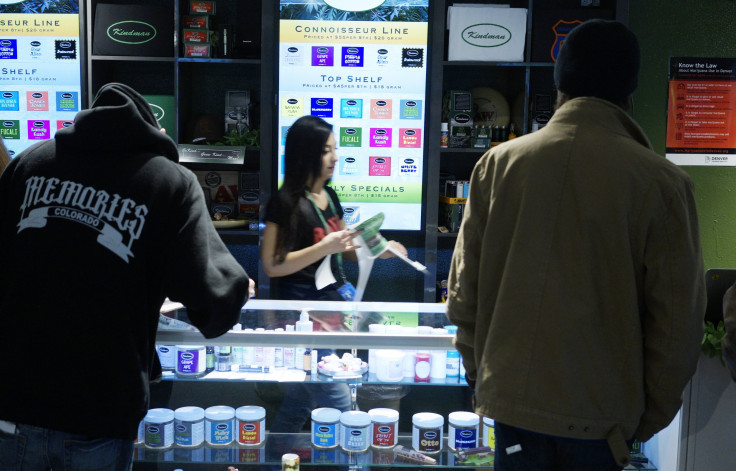Marijuana Lawsuits In Colorado Put Pot Businesses On Edge, But Cases Carry Little Weight

Pot businesses in Colorado are gearing up for a fight after a pair of lawsuits filed last week put the state’s recreational marijuana industry back in the crosshairs of those who’d like to see the experimental enterprise go up in smoke. Despite what legal experts say is tenuous evidence for claims that the industry has become both a liability and an eyesore for some Colorado residents, the cases have put many in the cannabis business on edge.
Even businesses not listed as defendants in the lawsuits are recruiting the help of professionals out of fear that they, too, could be targeted as a burden to their communities. “A lot of the big players in the industry, we have hired individuals, lobbyist and PR specialists who are actually going out to do their job to deflate this case,” said Justin Staley, owner of Tru Cannabis dispensary in Denver. The cases, brought by the Washington, D.C.-based advocacy group Safe Streets Alliance, which opposes marijuana legalization on the grounds that it conflicts with federal law, claim that other businesses and residents have incurred damages because of the pot industry, which they say fosters shady activity and has sullied Colorado’s landscape with more pot shops and growing facilities. “Anything that makes the news at this level and type of situation concerns any legitimate business owner in this industry," said Staley.
In many ways, such troubles have been part of Colorado’s retail marijuana enterprise since the first legal pot shops opened Jan. 1, 2014. While the spotlight that came with being the first state in the country to allow highly regulated and legal weed to be sold to people other than medical patients meant that business owners were careful not to bend the rules, many failed to anticipate some of the problems that would arise with selling cannabis-infused edibles and concentrates, sharing parking lots with family-friendly businesses or with bordering states less accepting of the industry.
Early last year, the death of a Denver college student who ate a marijuana cookie before jumping from the fourth-floor of a hotel, followed by the story of a woman whose husband allegedly shot and killed her after consuming pot candy, underscored a problem with suddenly offering very potent marijuana products to people who may not understand what constitutes a reasonable dose. Such events led to state legislators quickly passing laws to regulate how marijuana edibles should be packaged, including having clearly marked serving suggestions.
In December, lawmakers in Nebraska and Oklahoma sued Colorado over its recreational marijuana, claiming that the pot industry had led to an increase in illegal drug trafficking into their states. Such drug smugglers, they said, put a financial strain on their law enforcement and overburdened their justice systems.
The most recent lawsuits looking to capsize Colorado’s legal weed industry were filed Thursday with the U.S. District Court in Denver. The common plaintiff in both is Safe Streets Alliance. One lists the other plaintiff as New Vision Hotels Two, LLC, which owns some Holiday Inn franchises. The company has claimed that its hotel in Frisco, a popular Colorado ski town, has lost business because of a proposed marijuana dispensary that would open nearby. The lawsuit alleges that such businesses “drive away legitimate businesses’ customers, emit pungent, foul odors, attract undesirable visitors, increase criminal activity, increase traffic and reduce property values.”
The second lawsuit, listing as its plaintiffs Colorado property owners Phillis and Michael Reilly, claims that the construction of growing facility near their land has “marred the mountain views … thus making it less suitable for hiking and horseback riding.” Colorado's official response to the lawsuits is still pending, but former Colorado Attorney General John Suthers indicated the attorney general's office would "vigorously defend" against them.
Some in the marijuana industry question whether such lawsuits will hold up in court, let alone roll back an industry that has a strong foothold and has already raked in more than $50 million in tax revenue for Colorado. “We feel that the lawsuits are frivolous,” said Chris Woods, president of Terrapin Care Station, a combination recreational and medical dispensary in Boulder. “The state has benefited from taxing and regulating and educating its residence in terms of safe sales of cannabis.”
The crux of the Safe Streets Alliance lawsuits is that federal law trumps state law. The plaintiffs argue that federal racketeering laws prohibit Colorado from benefiting from activities considered illegal by the U.S. government. Gov. John Hickenlooper is among the defendants named in the lawsuits.
“The difficulty will be proving damages, not just sort of psychic harms – ‘my beautiful view has gone away,’” said Sam Kamin, a professor of law at the University of Denver. Despite New Vision Hotels’ claim that the hotel operator has incurred financial losses because of the proposed marijuana business, the pot shop hasn’t opened yet. “How much damage could they have done already?” said Kamin.
Colorado and Washington both legalized recreational marijuana in 2012, but Washington’s first pot shops didn’t open up until mid-2014. Colorado’s industry was built on top of an already successful medical marijuana industry that allowed the state to easily integrate retail sales into the scheme.
As more states continue to relax their marijuana laws or legalize weed altogether – Alaska’s new law legalizing small amounts of pot for personal use went into effect Tuesday; Washington, D.C. is expected to do the same Thursday – industry experts have said such lawsuits could be expected, but that they’re not enough to slow down marijuana legalization. “It’s another case of ‘not in my background,’” said Gregg Rotundo, who operates two pot tourism companies – 420 Layover Solutions and Club Cannabus Tours – out of Denver. “This legalization is just a train that’s not going to stop. You need to get on board or get out of the way.”
© Copyright IBTimes 2025. All rights reserved.





















